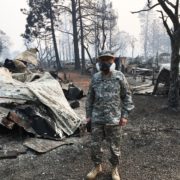D’vrei HaShomrim by Chaplain Matt Friedman
By Chaplain (Major) Matt Friedman, California State Guard, 195th Wing/Joint Forces Head Quarters
It’s December – a month of happiness and trepidation. How do we get through it and more importantly, how can we get through it and be happy about it? I’ll start with the challenging element with childhood memories and move to the celebratory. Why that order? In ancient days the Rabbis, even when delivering the harshest of messages would always end with a positive idea and encouragement. That will come, but for now the trepidation.
Trepidation is a sense of concern with an element of uncertainty and perhaps even some fear. What is it about December? It is typically when Hannukah occurs. Hannukah with latkes, gelt, and of course lighting the Menorah (some use the term Hanukkiah), is a time of anticipation. Along with those happy elements, it also comes with its definition as the Jewish Christmas. Many Jewish people have childhood memories of explaining that it isn’t a Jewish Christmas, many of us don’t eat ham on December 25 (or any other day), and we feel a bit uncomfortable singing songs that have no meaning to us or perhaps are in opposition to our beliefs. Some of these memories are distressing.
As an elementary student I attended a school where there were only a few Jewish families. Most classes had one, two or sometimes three Jewish students. My first memory of Christmas was in kindergarten. A man arrived at the school in a fire truck. He had long white beard and red and white clothes. My classmates were very excited. They called out, “Santa, Santa.” I had no idea what was going on. Within 30 seconds they all lined up, so I followed them. One by one they would sit on Santa’s lap and tell him what toys they wanted for Christmas, and he would reward them with a candy cane. I also wanted a candy cane, so I came up with a fine list of toys. It never occurred to me that I would get any of those toys, but I got a candy cane, and I eagerly told my friends that I liked Santa. At some point during that month, we were ushered into the auditorium, and we were told we needed to learn a song that we would sing at an assembly. The song was called “Silent Night.” The words were strange to me, and I couldn’t understand why there was such attention being directed at a baby. What was the big attraction? There are babies everywhere and they usually cry and need to have diapers changed.
By fourth grade, the Jewish parents had convinced the principal that singing Christmas songs and making tree ornaments wasn’t of interest to us. Two events stand out. The Jewish kids were excused, much to our joy, from singing Christmas songs. The Muslim kids also asked to be excused. The principal turned down the request. At that moment it occurred to me that the principal, who was generally a very nice man, didn’t quite understand that it also did not make sense for the Muslim kids to sing the songs. That same year the teacher came up with a solution to our lack of interest in making tree ornaments. She crafted a flat Menorah out of black construction paper. For the next three weeks, Mark Ehrlich, the other Jewish kid in the class, and I cut up pieces of colored paper and glued them to the paper Menorah. It was boring, but we were avoiding ornaments and singing. As vacation time approached the teacher realized she had a dilemma. There were two boys, but only one (ghastly) art project. Immediately, we both offered to send it home with the other. The teacher was touched by our magnanimity! In her Solomonic wisdom she decided to cut it in half. We looked at each other and realized we were expected to take home our half of the Menorah. Both sets of parents found the entire incident ridiculous and hilarious.
While many of use share similar memories from our childhood, we can now view Hannukah as adults and adults in the military. Over the years I have contemplated how to think of the holiday and as a Jewish chaplain serving all faiths, how to make it relevant. While there are many themes and lessons from the Hannukah story, there is one that can resonate with everyone. Hanukkah is a story of optimism. During this time of year, the days are short and often gray. Some are deployed far from home. Hannukah takes the symbol of increasing light to give us a message of optimism and positivity. The rededication of the Temple reminds us that we can not only endure, but we can thrive.
Volume 76. Number 4. 2022




